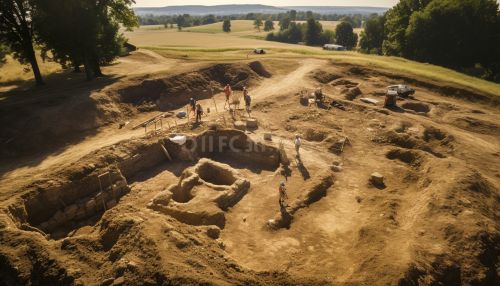Archaeology
Introduction
Archaeology, from the Greek words "archaios" meaning ancient and "logos" meaning study, is the scientific study of human history and prehistory through the excavation of artifacts and structures, and the analysis of physical remains. It is a subfield of anthropology, the study of all human culture. From million-year-old fossilized remains of our earliest human ancestors in Africa, to 20th century buildings in present-day New York, archaeology analyzes the physical remains of the past in pursuit of a broad and comprehensive understanding of human culture.
History of Archaeology
The history of archaeology has been one of increasing professionalism and the development of a variety of different methods, techniques, and theoretical perspectives. Archaeology as a serious academic and scientific endeavor began in the 19th century. Prior to this, much of what could be considered archaeology was a form of treasure hunting. The change towards a more scientific approach to the past came about due to the influence of the Age of Enlightenment.
Archaeological Methods
Archaeological investigations are a principal source of knowledge of prehistoric, ancient, and extinct culture. The word comes from the Greek archaia ("ancient things"), and logos ("theory" or "science"). The archaeological process involves several stages, from the initial survey and excavation to the eventual analysis and publication of the findings.
Survey
The first task in an archaeological investigation is to find a site to study. To do this, archaeologists use a variety of methods, from traditional walk-over surveys to technologically advanced remote sensing techniques like satellite imagery and ground-penetrating radar.
Excavation
Archaeological excavation is a destructive process that involves the systematic removal of layers of soil and other material covering and surrounding an artifact or structure. This is often done in a grid-like pattern to keep track of where each artifact was found.
Analysis
After the artifacts are excavated, they are taken to a lab to be cleaned, catalogued, and analyzed. Through careful examination and study, archaeologists can not only identify what an object is but also what it was used for, and often, how it was made.
Archaeological Theory
Archaeological theory refers to the various intellectual frameworks through which archaeologists interpret archaeological data. It deals with the goals and methods of the archaeological investigation and how the archaeologists convert the raw data into meaningful information.
Archaeological Sub-disciplines
There are many sub-disciplines within archaeology, each with their own specific techniques, theories, and areas of interest.
Prehistoric Archaeology
Prehistoric archaeology is the study of the past before historical records began. It deals with the time period during which humans first began using tools, up to the start of recorded history.
Historical Archaeology
Historical archaeology is the study of cultures with some form of writing. It combines the use of historical records and archaeological methods to gain a better understanding of the past.
Underwater Archaeology
Underwater archaeology studies human interaction with the sea, lakes, and rivers. It includes the study of physical remains found in the water such as shipwrecks, harbors, and other structures.
Impact of Archaeology
Archaeology has had a significant impact on our understanding of the past. It has helped to debunk many myths and misconceptions about our ancestors and has provided evidence to support historical accounts. It also plays a crucial role in cultural preservation and is often used in the field of heritage management.
See Also


